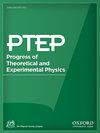李-威克复鬼场理论中的单一性违反
IF 8.3
4区 物理与天体物理
Q1 Physics and Astronomy
引用次数: 2
摘要
具有四阶导数的理论,包括Lee-Wick有限QED模型和二次引力,具有较好的UV行为,但负度量幽灵模式的存在危及了统一性。Lee和Wick特别注意到幽灵通过辐射修正获得了一个复杂的质量,他们声称,由于能量守恒,这种复杂的幽灵永远不会由物理粒子的碰撞产生,因此物理s矩阵的统一性必须保持不变。研究了量子场论中算子形式下的一致性问题。当复杂幽灵参与时,一个复杂的δ函数(狄拉克δ函数的泛化)出现在每个相互作用的顶点,它强制执行一个特定的复能量守恒定律。它的特殊性质意味着,如果在事先考虑守恒定律后将四动量分配给内线,则朴素费曼规则是错误的。我们证明了在这种四阶导数理论中实际上产生了复鬼,并且违反了统一性。我们还发现了一个确定的能量阈值,在这个阈值以下,幽灵就不能被创造出来:理论是统一的,在这个阈值以下是可重整的。本文章由计算机程序翻译,如有差异,请以英文原文为准。
Unitarity Violation in Field Theories of Lee-Wick’s Complex Ghost
Theories with fourth-order derivatives, including the Lee-Wick finite QED model and Quadratic Gravity, have a better UV behaviour, but the presence of negative metric ghost modes endanger unitarity. Noticing that the ghost acquires a complex mass by radiative corrections, Lee and Wick, in particular, claimed that such complex ghosts would never be created by collisions of physical particles because of energy conservation, so that the physical S-matrix unitarity must hold. We investigate the unitarity problem faithfully working in the operator formalism of quantum field theory. When complex ghosts participate, a complex delta function (generalization of Dirac delta function) appears at each interaction vertex, which enforces a specific conservation law of complex energy. Its particular property implies that the naive Feynman rule is wrong if the four-momenta are assigned to the internal lines after taking account of the conservation law in advance. We show that the complex ghosts are actually created and unitarity is violated in such fourth-order derivative theories. We also find a definite energy threshold below which the ghosts cannot be created: The theories are unitary and renormalizable below the threshold.
求助全文
通过发布文献求助,成功后即可免费获取论文全文。
去求助
来源期刊

Progress of Theoretical and Experimental Physics
PHYSICS, MULTIDISCIPLINARY-PHYSICS, PARTICLES & FIELDS
CiteScore
12.00
自引率
5.70%
发文量
148
审稿时长
17 weeks
期刊介绍:
Progress of Theoretical and Experimental Physics (PTEP) is an international journal that publishes articles on theoretical and experimental physics. PTEP is a fully open access, online-only journal published by the Physical Society of Japan.
PTEP is the successor to Progress of Theoretical Physics (PTP), which terminated in December 2012 and merged into PTEP in January 2013.
PTP was founded in 1946 by Hideki Yukawa, the first Japanese Nobel Laureate. PTEP, the successor journal to PTP, has a broader scope than that of PTP covering both theoretical and experimental physics.
PTEP mainly covers areas including particles and fields, nuclear physics, astrophysics and cosmology, beam physics and instrumentation, and general and mathematical physics.
 求助内容:
求助内容: 应助结果提醒方式:
应助结果提醒方式:


